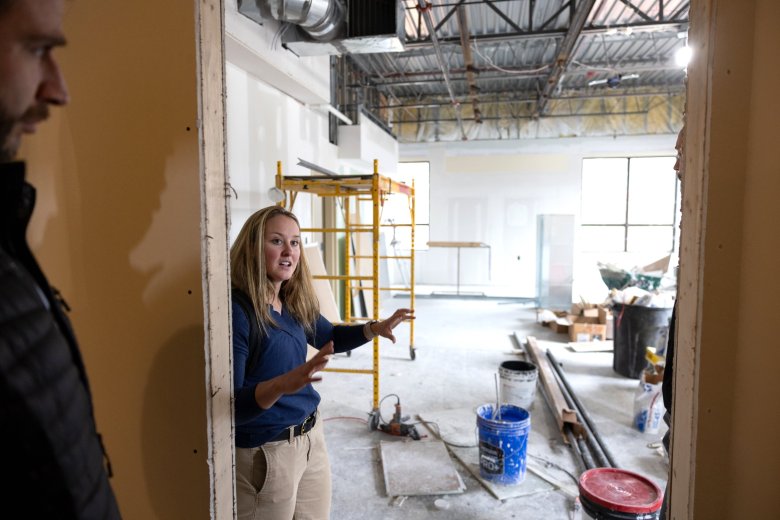United Way is set to open two new child care centers in Maine, aiming to address the pressing issues of access and affordability in child care. The facilities, located in South Portland and Freeport, are expected to accommodate approximately 200 children when they open in early spring of 2026. This initiative is part of the nonprofit’s United 4 Children program, which seeks to alleviate the barriers that prevent working families from accessing necessary child care services.
The South Portland center is currently undergoing renovations on Gannett Drive. Once completed, it will provide child care for around 100 infants and young children. According to Josh Waxman, senior vice president of community impact at United Way of Southern Maine, the lack of affordable child care is a significant barrier for many families considering starting their own. “The reality is there are too many working families that aren’t starting families in Maine because they don’t have child care,” he stated.
Addressing Maine’s Child Care Challenges
Child care access has been a longstanding issue in Maine, with many families struggling to find affordable options. The United Way centers plan to implement a public-private partnership model. Businesses, whose names have yet to be disclosed, will contribute through charitable donations. In turn, these organizations will have access to child care services for their employees, as well as the wider community.
Rebecca Alfredson, senior director of programs at United Way of Southern Maine, emphasized the importance of catering to diverse workforce needs. “Your folks who are doing surgery need child care, and your folks who are janitorial staff need child care,” she said. “How do we create a model that works for both?”
In addition to the centers in South Portland and Freeport, United 4 Children has plans to open several more facilities in the coming years. This initiative aims to expand child care options significantly in southern Maine, with the goal of establishing hundreds of additional spots.
Legislative Efforts and Community Support
Maine lawmakers are also actively working to improve child care accessibility. Senate President Mattie Daughtry, a Democrat from Brunswick, has been conducting a listening tour across the state. This initiative aims to gather insights from child care providers and parents. Daughtry is drafting legislation that she hopes will address the concerns of the child care community, with a draft expected to be released in January.
Daughtry has noted the importance of compensating child care workers adequately for their vital roles. Maine currently offers several support programs, including stipends for child care workers, which have faced funding challenges. A tuition assistance program for low-income families is also available but has a long waiting list, highlighting the urgent need for sustainable funding mechanisms.
“Existing programs are great, but vulnerable,” Daughtry remarked. “We need to find truly sustainable funding mechanisms, because we have waitlists and programs that could be on the chopping block if we don’t protect them.”
The collaboration between organizations like United Way and local businesses is vital in addressing the child care crisis. As part of this effort, Bath Iron Works, one of Maine’s largest employers, recently opened a child care facility in Brunswick, providing 120 slots, with two-thirds filled by employees of the company.
Quincy Hentzel, president of the Portland Regional Chamber of Commerce, highlighted the importance of the new child care centers in Freeport and South Portland. The initiative emerged from discussions with business leaders about how the lack of child care options affects workforce participation. Following a survey of over 1,000 employees, findings revealed that a significant number of respondents require child care support outside traditional working hours.
“Our primary focus at the chamber is to remove barriers that prevent people from entering the workforce in Maine,” Hentzel noted.
To ensure the successful operation of the new centers, United Way is collaborating with licensed child care providers to tackle staffing challenges. The centers aim to cater to second and third-shift workers, including nurses and restaurant employees, with plans for a 24-hour facility within the next two to three years.
Despite the regulatory hurdles that have delayed the facility’s opening, both Waxman and Alfredson believe that the child care industry should be regulated but assert that the current barriers are excessively high. Alfredson pointed out the necessity for compliance with various regulations, such as bathroom requirements and classroom sizes, which differ by municipality.
“Look at COVID; we got things done fast. We should be treating child care the same way,” Waxman expressed. “The government response, while well-intended, has not kept pace with the urgency of this crisis.”
As the new child care facilities prepare to open, the combined efforts of United Way, local businesses, and lawmakers may pave the way for a more accessible and affordable child care landscape in Maine.







